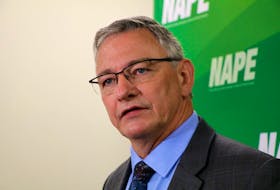While he welcomes the new waste management system coming into effect in western Newfoundland, Corner Brook Mayor Jim Parsons says there is an opportunity to make it even better.
The new Sort-It Western program expands the amount of material residences can recycle, which should help cut down the amount of solid waste headed to landfills.
What it doesn’t include is a component for people to get rid of organic waste separately at the curbside.
Related stories:
Western Regional Waste Management looking at setting up its own composting facility
Composting bins bought for Bay St. George Waste Management Committee have arrived
The weight of organic waste within the regular trash stream will keep the cost of shipping waste to central Newfoundland higher than what it really needs to be, said Parsons.
According to the mayor, Corner Brook alone has been averaging around 4,000
tonnes of waste annually in the past few years. It is estimated, he said, that around one-third of this trash is compostable material.
The city is expecting the new waste-management system will result in the city’s tipping fee costs rising from $59 to $164 per tonne next year. Parsons said that represents roughly $750,000 in new expenses, in addition to the cost of the city’s waste collection contract.
“Obviously, this is the way of the future and this is what we should be doing, but a big portion of this garbage we’ll be hauling to central will be organics that could potentially be dealt with here on the west coast,” he said. “I think it’s a real business opportunity and there’s a role for the private sector here.”
The numbers Parsons quoted only refer to residential waste. He said the amount of organic material to be collected rises dramatically when institutions like hospitals and schools, not to mention waste from restaurants, grocery stores and other businesses are factored in.
Not only could a company charge a fee to collect organics, Parsons noted it could also sell the compost that could subsequently be derived from it.
Josh Carey, chair of the Western Regional Waste Management board of directors, said the issue of organic waste has been discussed at the board level and he agreed there may be an opportunity for the private sector to step in.
In fact, he said the board has already had some preliminary discussion with a western Newfoundland-based business that might be interested and more meetings with that party are scheduled for later this year.
Dealing with organic waste as a business opportunity is not without its challenges, cautioned Carey. He said many people already compost on a smaller scale in their backyards and any business opportunity on a regional scale would have to factor in the vast geography of western Newfoundland and figure out the best method to process the organic waste that would be collected.
“The board has made a commitment to looking at organics, but the board has also said it has to be done cost effectively, cost efficiently and in an environmentally sustainable and economically sustainable manner,” said Carey. “We can’t do it at all costs but it is certainly something we will be looking at.”









